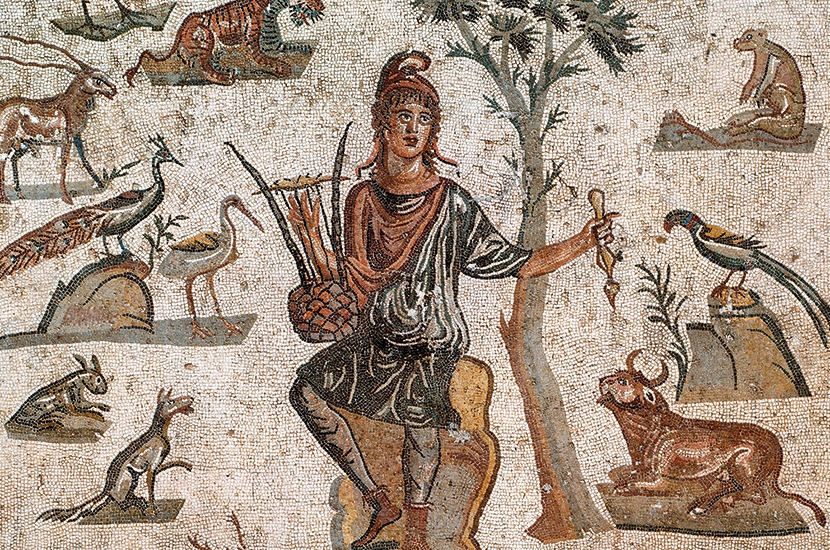We are experiencing a boom of popular books on Greek mythology: Stephen Fry’s Mythos; Natalie Haynes’s Pandora’s Jar; Liv Albert’s Greek Mythology: The Gods, Goddesses, and Heroes Handbook, to name a few. Admittedly, Greek mythology has it all: love, sex, murder, incest, cannibalism, magical transformations, pirates, monsters, miracles. Surely some readers, though, will want to go even deeper, to tap into the ancient sources, incorrigibly plural and various.
These sources include Homer’s Iliad and Odyssey and Hesiod’s genesis and who-begat-whom of the gods, the Theogony. (Plus a chunk of ‘Greek’ mythology which we actually get via the Roman poet Ovid.) But much of the mythology concerning the Greek gods — not just the 12 Olympians but figures such as Hekate, Pan, the Sun and the Moon — comes to us from hymns.
In this gem of a book, Barry B. Powell gives us new translations of a millennium’s span of ancient Greek hymns. Organised not by chronology or manuscript but deity (starting with Zeus), it can be read straight or flipped through as a handy reference. Physically gorgeous — cloth, sewn, with a starry dust jacket and celadon-green end-papers — it would make a fine gift for a myth buff or classics enthusiast, or an ideal source book for a mythology course. With maps, sharp full-colour photographs of relevant ancient art and a glossary-cum-index (complete with pronunciation guide), the book is a pleasure to hold and easy to use, the size of a slender, well, hymnal.
Powell, a scholar and a translator who has tackled the three major epics, wears his learning as lightly as seersucker. He elucidates complex scholarly matters — manuscript traditions, Greek meter, Neo-Platonism — in layman’s language. ‘A hymn is a song to a god, originally sung, usually to a lyre,’ he begins, quietly tuning up. The hymns here are of four types: anonymous Homeric hymns; Orphic hymns associated with the legendary Orpheus; hymns composed by the Alexandrian polymath Callimachus (c. 310-c. 240 BC); and hymns by Proclus (AD 412-85), the ‘last of the great Classical Greek philosophers’, refining Neo-Platonism even as the classical world pivoted towards Christianity.
It is from the Homeric ‘Hymn to Demeter’ that we have the story of Hades and Persephone and the pomegranate seeds, so beloved of poets and artists. When Persephone, the young daughter of the agricultural goddess Demeter, is abducted by Hades, king of the underworld, we have this description:
So long as the goddess looked on the earth and the starry sky, and the violent fish-filled sea and the rays of the sun, and she still hoped to see her dear mother and the tribes of the gods who live forever, for so long hope calmed her great heart, in spite of her anguish. And the peaks of the mountains echoed and the depth of the sea at her deathless cry.
This never fails to move. Other hymns are playful, even funny. Consider the Homeric ‘Hymn to Hermes’, the liminal trickster god, whose purview is merchants and thieves, messengers and boundaries. Here we get Hermes’s ‘origin story’ and first naughty exploits. The son (as so many) of Zeus and a retiring goddess, Maia, Hermes gets into mischief from the moment he is born. Jumping from his crib, he first invents the tortoise-shell lyre, and then, having worked up an appetite, goes in search of beef. The 50 cows he proceeds to rustle belong to his half-brother Apollo; by driving them backwards, he leaves puzzling tracks to confuse pursuers. When Apollo finally catches up with him the next day, Hermes, curled up in his cradle, denies any knowledge:
I was born yesterday, my feet are tender, the earth is hard beneath. If you want, I will swear a great oath on the head of my father: I promise that I am not guilty! Nor have I seen any other thief of your cows — or whatever cows are, I have only heard about them.
Protesting his innocence, Hermes remembers that, born yesterday, he has plausible deniability of knowing what a cow even is. When Apollo snatches up the infant, Hermes farts and sneezes, expelling omens from both ends at once. The image of Hermes as a wise–cracking baby is straight out of Looney Tunes.
Sometimes as much of a third of a page is footnotes. Powell doesn’t gloss over obscure place names or epithets in the poems; rather, he glosses them at the bottom of the page. A translator aiming for pure lyric might take a different tack. (Those interested in reading the Homeric Hymns qua English poems might look to Peter McDonald’s versions.) But the footnotes turn out to be a treasury unto themselves, unpacking geography, etymologies, cultural practices and related myths. Powell is generous, too, with bonuses, such as translating germane passages from Homer and Sappho’s famous song to Aphrodite.
His stated goals as a translator are modest: ‘Dactylic hexameter does not work well in English, and I abandon it entirely in this translation, preferring a rough five-beat iambic line that accurately preserves the meaning of the Greek.’ Whether five beats (as opposed to four or seven) are always hearable, I might quibble: sure-footed ‘loose iambs’ are tricky to manage unless you have the ear of Robert Frost. But Powell is always sensitive to the Greek, and brings it across into clear, natural English, at the pitch-perfect register for the solemn or the ludic hymn.
Hymns often served as introductions to longer poems, on-ramps, as it were, to the highway of song. They have a way of ending: ‘I will remember you and another song too’, so that the end of one here seems to begin the next, a sort of golden chain. Fittingly, the very last hymn is Proclus’s ‘Hymn 4: To All The Gods’. It is actually a kind of hymn to hymns, to the divine power of words and books: ‘Reveal to me, as I ascend the path/ that leads upwards, the rites and initiations of sacred words!’ To which I say Amen.






Comments